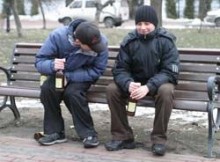In one of her little-known stories Lesia Ukrainka writes that ever since man decided he wanted to find happiness he has lost himself in this quest. Today, success and money are the closest synonyms of the notion of happiness. Adults are busy working, building their careers, and making money. Meanwhile, their children, unless they are engaged in art or sports, or are keeping themselves occupied and asserting themselves, are spending endless hours in front of the television or seeking the fullness of life out on the streets. Since nature abhors a vacuum, this spiritual emptiness is filled with something else.
LOW-ALCOHOL EVIL
Experts at the World Health Organization have established that Ukrainian teenagers are the world’s leading consumers of alcoholic drinks, and minors are increasingly frequently ending up in rehab clinics.
Hennadii Zilberblat, the chief psychiatrist and addiction expert for Kyiv oblast, said: “Ten to fifteen years ago we did not have any patients diagnosed as suffering from beer-induced psychosis; now our emergency wards see beer-addicted patients who are in critical condition, with expected exacerbations, such as hypertrophied hearts and livers, all these being manifestations of beer-related alcoholism. Alcohol damages a person’s physical and mental condition. There are increasing numbers of acute and chronic alcoholic psychoses; people under the influence commit serious crimes. The number of fatal accidents caused by drunk drivers has increased several times over.”
Addiction experts insist that most of their patients are young people below 35 years of age. Official statistics point to more than a million alcoholics in Ukraine, but experts say this number should be multiplied by eight (to this figure add half of school-aged children who are also regular drinkers). One of the explanations for the high rate of alcoholism among the young is the fact that Ukrainians have taken avidly to so-called low-alcohol beverages: beer, gin and tonic, and coolers-flavored alcoholic drinks that contain food dyes which, combined with alcohol, produce an even stronger intoxicating effect. In Ukraine, these types of alcoholic beverages are probably the cheapest in the world.
Mykhailo Ihnatov, head of the social and experimental narcology department at the Institute of Social and Forensic Psychiatry, noted: “From the biological standpoint, the amount of damage to human health is directly proportional to the amount of alcohol consumed. Therefore, medically speaking, there is no difference between types of drinks; all are damaging to the body. Young people are the main consumers of beer and gin and tonic. The amount they consume is large — this fact was first noted by WHO experts. Classifying drinks as low— and high-alcohol-content is artificial; even worse, this has resulted in Ukrainian legislation being passed with clauses relating to beer and vodka, so a liquor store clerk can sell a bottle of beer to a minor cannot be prosecuted.”
It is bad to play around with beer. Since 2005 health ministers throughout the world have categorized alcohol dependence as a psychiatric pathology.
HAPPINESS AND BEER: BAD EXAMPLES ARE CONTAGIOUS
What about our children? Psychologists say that they mimic every adult’s gesture by three to four years of age — and then mimic their actions with an amazing degree of precision. You can watch them in daycare centers pretending to clink glasses. In their teens they will be drinking beer like Klitschko the boxing star or the Shevchenko the soccer star. At the very least, young people with a more critical outlook experience inner conflict. They know that drinking is bad for their health, but look at all those stars! They’re doing it!
Another reason that can turn a person toward alcoholism is frustration (great disillusionment). People are ambitious, and their aspirations are very much in play; all of us have a normal desire to be successful and happy individuals aiming for perfection. (This reporter has dealt with a number people, mostly men, who have their feet firmly on the ground, who are masters of their own destinies, who have hundreds of people on their payroll, and practically all of them are teetotalers).
Dr. Zilberblat believes that “for a person to feel happy, in addition to self-love and love of nature and one’s surroundings, life goals and motivation must coincide with capacities. Now that we are being constantly shown the happy lifestyles of our oligarchs and celebrities, the individual faces a conflict (especially in middle age). He realizes that he has failed somewhere along his life’s path, compared to these rich and famous people. This also concerns the preventive treatment of alcoholism, because happiness depends on the kind of guidelines an individual receives in childhood — those that are instilled by one’s parents and by society. There are certain traditions. It is one thing when an individual is raised the right way, when he plants a tree, raises a child, builds a home. Another thing is when this individual is programmed to become a moneygrubber who wants to bathe in gold.”
The sad fact remains that such life situations have not come true for most men in Ukraine. Epidemiology statistics show that the worst alcohol abusers are married Ukrainian men, aged 26-50. Whereas in most other countries the presence of a wife and children helps an alcoholic kick the habit, in Ukraine the situation is the exact opposite: men drink more. This paradox has stunned researchers, although they are not surprised by the increase in female alcoholism (girls aged 18-25 are in the biggest problem bracket, but with age the incidence tends to decrease). To complicate matters, no one even tries to discuss the possibility of seeking help from psychologists or addiction specialists.
Stanislav Kostiuchenko, a consulting physician with the Ukrainian Association of Psychiatrists, says: “A mere seven percent of people who need professional help, who suffer from various degrees of alcoholism, seek help, but this is a very imprecise statistic. First, they don’t know that they need help, although in our questionnaire we offered a list of institutions where they could find help, as well as the names of natural healers. Second, people with drinking problems will never admit that they have a problem. We have ascertained that the alcohol consumption ratio is somewhat higher in the southeastern region, where men filled out our questionnaires in Russian.”
BAD TRADITIONS
In addition to everything stated above, one of the reasons behind the spread of alcoholism in Ukraine is traditions. Whereas experts say that few people would urge a diabetic to have a slice of a cake during a family celebration, the opposite is true with regard to alcohol. This is a fact, banal as it is. Overcoming such harmful traditions is probably the most difficult task for the coming generations, as difficult as breaking the heredity chain (genetic predisposition to alcoholism). Addiction specialists warn that it takes five generations to break this inherited tendency. This problem must be resolved and requires immediate measures on the part of the government and on a lower level: the family. Statistics indicate that 40,000 people die in Ukraine every year because of excessive drinking.
Dr. Ihnatov says that “few people ponder the fact that an individual loses a certain number of nerve cells every day after reaching the age of 21. The point is the rate at which we lose them, especially when the process is sped up by alcohol and smoking. This has a direct bearing on our life span and the quality of our life. In addition to the fact that our men and women retire at an earlier age, compared to other European countries, they are also losing much in terms of functional capacities.”
Experts are convinced that the government must start by banning tobacco and alcohol ads and commercials in order to save what it already has. Parents must revise their values. Perhaps they will decide that there are more important things in their quest for happiness apart from making money, like seeking contact and understanding with their children, sharing in their successes, and going on family outings. They should also take a look at themselves, hung- over, in the bathroom mirror and try to see their children’s futures in them.
COMMENTARY
Dr. Roman LISHCHUK, director of the nonprofit organization Institute for Problems of Drug Addiction and Addicts:
There are many causes of juvenile alcoholism. Taken together, they contribute to juvenile delinquency and an increase in the numbers of street kids. I would, therefore, view juvenile alcoholism from the standpoint of increased behavioral risks: for the sake of one’s own health, on the one hand, and on the other, for the sake of society. Probably beer should not be blamed so much for wrongdoings committed by people under the influence — if consumed in moderate quantities — as the fact that an intoxicated individual is capable of committing acts that put others at risk. Children can become aggressive, uncontrollable, overexcited. A young man can be arrested for smashing a beer bottle on the sidewalk, but children don’t realize this. Since our social values have changed from humanistic to materialistic, money-making methods have also changed. Now our children can also apply them. It is one thing to work as a newspaper carrier and an altogether different one to peddle drugs. No one explains these things to our children.
As regards the family, since parents are devoting more time to their jobs than raising their children, cultural and spiritual values as well as family upbringing have been nullified: increasing numbers of our children are being raised on the street. Nor should we forget that the current generation of parents consists of people who were born in the 1980s-1990s, the times of perestroika, the change of valuable guidelines, and social transition. So many parents may lack something very important that they should be giving their children: life’s wisdom, a world view in which the spiritual factor is more important than the material one. Add here early marriages of young people, early divorces, and single mothers raising children. It follows that our children are evolving precisely how our society allows them to.
I am convinced that the situation with the younger generation in Ukraine can be improved by the introduction of a special national program and measures adopted on a “lower level” -setting up sports clubs, hobby groups, instead of leasing out premises for offices. We must get our children away from the streets. Obviously, it is necessary to ban tobacco and alcohol ads, as has been done in other countries, including those that feature soccer and boxing stars.








